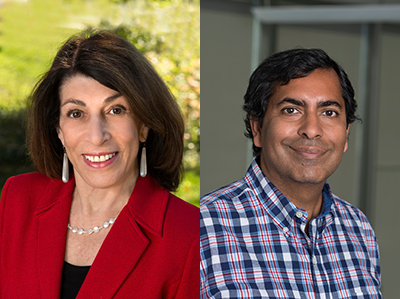
Ariela Sofer and Sanjeev Setia.
Ariela Sofer and Sanjeev Setia have been named interim divisional deans for the Volgenau School of Engineering and the proposed School of Computing.
Sofer will become interim divisional dean for engineering, and Setia will be interim divisional dean for computing while an international search takes place for permanent divisional deans. Volgenau School of Engineering Dean Ken Ball will lead the proposed College of Engineering and Computing.
“The purpose of these appointments will be to provide leadership and guidance during a time of transition for the two schools,” Ball said. “Both bring years of experience and knowledge in their respective fields to the jobs. They are talented and committed leaders.”
Sofer, the current associate dean for Administration and Faculty Affairs, served as department chair for the Department of Systems Engineering and Operations Research for almost 16 years. She is a prolific researcher, author, leader, and organizer. She has also held board positions on four different leading professional associations.
Setia, Volgenau’s associate dean for Computing Programs and Initiatives, brings a wealth of administrative experience to the position. In addition to serving as chair of the Computer Science department for two terms from 2011 to 2019, he served as interim chair of the Computer Science department in 2006-07 when Computer Science and Information and Software Engineering merged.
Sofer and Setia agree that obtaining approval from the State Council for Higher Education in Virginia (SCHEV) is a top priority. The three goals they seek to address at the same time include:
- Write the SCHEV proposal for the creation of the School of Computing and the reorganization of the school of engineering into the College of Engineering and Computing;
- Develop bylaws and a governance structure for the proposed School of Computing and determine how it will interface with the School of Engineering and other schools;
- Take the steps necessary to boost enrollment in Mason’s Tech Talent Investment Pipeline-eligible master’s programs.
“The bylaws should foster and promote cross-disciplinary collaboration in our educational programs, and in research,” Soffer said.
Setia said the biggest and most immediate challenge is boosting enrollments in the master’s programs in computer science, software engineering, and computer engineering.
Actively engaging faculty will be the key to the successful launch of the new structure, the interim deans said.
